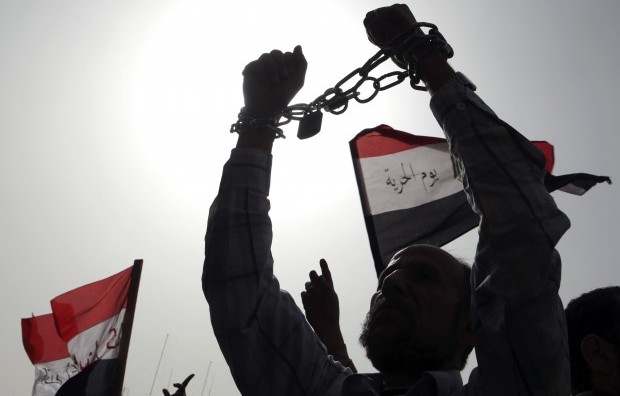The events on the second anniversary of Egypt’s 25 January revolution suggest that whether you are a skeptic or an optimist, Egypt is in for a long night. The opposition to the Muslim Brotherhood’s rule is now genuine and deep-rooted, and increasing day by day. This is despite all the attempts in Egypt to clear the air, whether through the media, politics or even through intimidation.
What was witnessed throughout Egypt on Friday and afterwards suggests that there will be no stability in the country for the foreseeable future, as long as no serious or realistic solutions are being adopted to reassure the people and move Egypt forwards.
The second anniversary of the 25 January revolution suggests that Egypt is in a deep and difficult crisis. Incomplete solutions cannot be imposed either by force or through maneuvers, especially since there is one party watching and waiting like an eagle, namely the army, and the Brotherhood’s regime is incapable of suppressing it or imposing its own fait accompli. The strength of the army is unparalleled. This is apart from Western media reports that suggest the Brotherhood are also incapable of imposing their control on the joints of the Egyptian state, whether at the level of technocrats, the police, or even the state media, let alone private outlets, and not to mention the business sector.
The Brotherhood’s problem, not only in Egypt but in all countries of the Arab Spring, is that they have offended everyone with their greed for power and their overwhelming desire to seize everything, from the trade unions to the presidency, the People’s Assembly, the Shura Council, and the government. Not even a novice in politics would engage in so much political tampering, so why are we seeing it from a group that has been active for the past eight decades? This is a puzzling matter; the Brotherhood have rushed to claim everything and have turned against their partners in the revolution, even though the Brotherhood themselves were late in coming out against Mubarak. Therefore, the reality dictates that they will lose, at an alarming speed, not only in Egypt but in most Arab countries. When the people of Egypt see what they are seeing, especially with renewed deaths among the ranks of the demonstrators, then they, i.e. the people, begin to consider the Brotherhood in the same light as they saw Mubarak, or others like him. This is especially since on the same day as the deaths were reported in Egypt, six Iraqis demonstrating against Nouri Al-Maliki in Fallujah, Iraq, were killed by the Iraqi army.
Therefore, as long as the Muslim Brotherhood in Egypt do not realize the gravity of the situation in their country, and the reality of the opposition towards them given that the Brotherhood have united everyone against them due to the fatal errors they have committed then they will lose, and faster than anyone would have imagined. What is most important here of course is the Egyptian interior. The last thing the Brotherhood wanted was to inherit a divided nation, yet the nation of Egypt here has been divided at the hands of the Brotherhood themselves, and hence their eventual loss will be very costly. However, few rational minds seem to be aware of this so far, for we have yet to see an opposition voice towards what the Brotherhood is doing from inside the group itself.
To summarize, what is happening in Egypt requires quick and earnest solutions, not quick fixes. Otherwise, Egypt is in for a long night, and so is the region as a whole.
